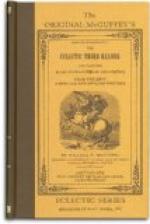This public recognition of the influence of these readers upon the mind and character of this great preacher is again noted in Rev. Joseph Fort Newton’s biography of David Swing in which the books which influenced that life are named as “The Bible, Calvin’s Institutes, Fox’s Book of Martyrs and the McGuffey Readers;” and the author quotes David Swing as saying that “The Institutes were rather large reading for a boy, but to the end of his life he held that McGuffey’s Sixth Reader was a great book. For Swing, as for many a boy in the older West, its varied and wise selections from the best English authors were the very gates of literature ajar.”
One of the most eminent political leaders of the present day attributes his power in the use of English largely to the study of McGuffey’s Sixth Reader in the common schools of Ohio.
[How a Japanese Learned English]
At a dinner lately given in New York to Marquis Ito of Japan, the marquis responded to the toast of his health returning thanks in English. He then continued his remarks in Japanese for some eight minutes. At its close Mr. Tsudjuki, who was then the minister of Education in Japan, traveling with Marquis Ito as his friend and companion, and who had taken shorthand notes of the Japanese speech, rose and translated the speech readily and fluently into good English. One of the guests asked how he had learned to speak English so correctly. He replied that he had done so in the public schools of Japan and added, “I learned my English from McGuffey’s Readers, with which you are no doubt familiar.”
[The Authorship]
It is not unusual to see in the literary columns of a daily newspaper inquiries as to where certain poems may be found of which a single stanza is faintly recalled. Many of these prove to be fragments of pieces that are found in the McGuffey Readers. Quite lately Theodore Roosevelt made the public statement that he did not propose to become a “Meddlesome Matty.” This allusion was perfectly clear to the millions of people who used the McGuffey Readers at any time after 1853.




